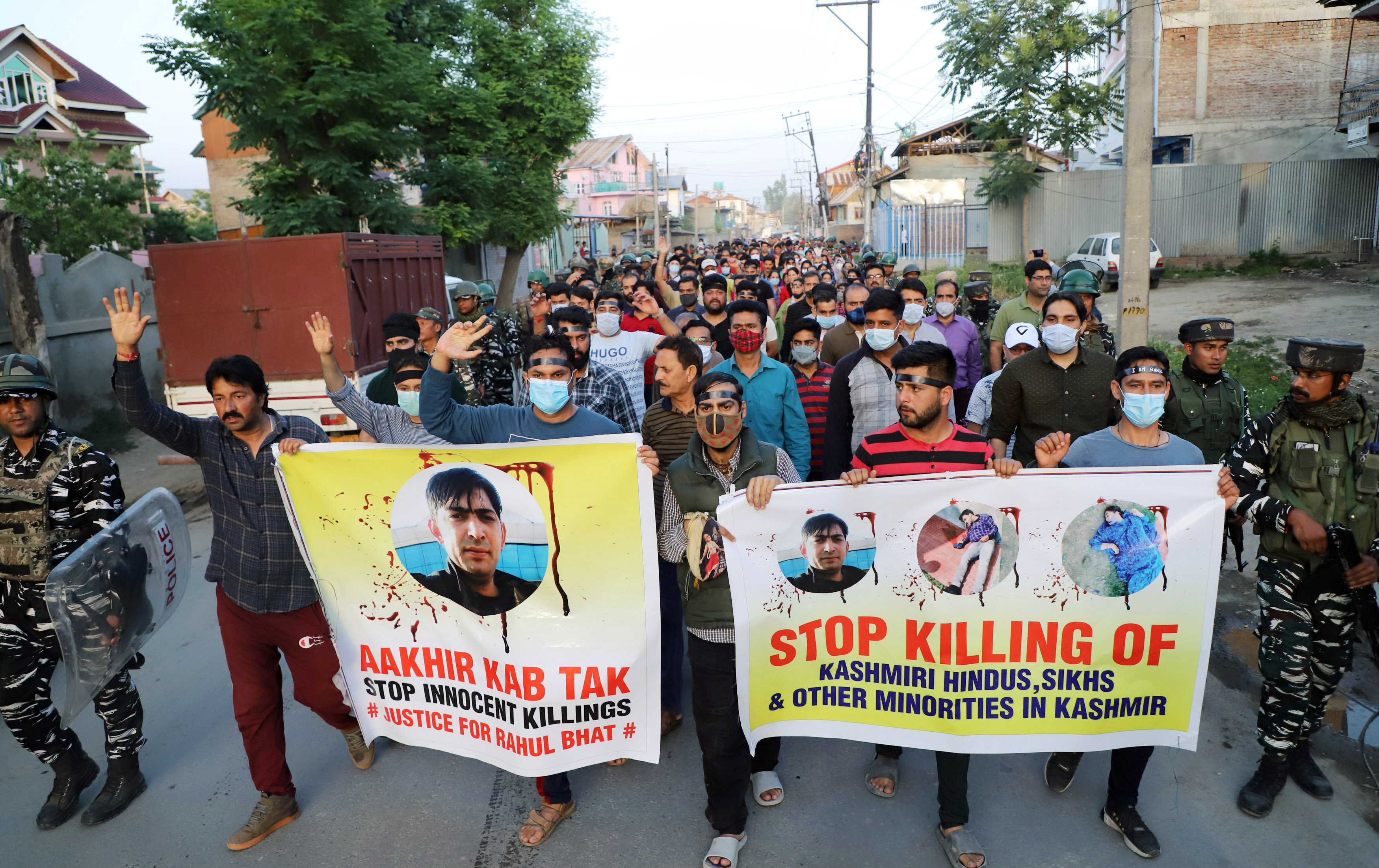In their grief and rage, Kashmiri Pandits must be careful not to walk into the terrorist trap.
The dastardly gunning down of 35-year-old Rahul Bhat, a Kashmiri Pandit in Budgam district on 12 May is a desperate bid by Pakistan based terrorists to disrupt the normalization process; an attempt to shake the composure of the government, accentuate the fading fault lines of religious polarization and to stall any reversal of the ethnic cleansing of Hindus that was effected nearly 30 years ago.
To date at least 14 Hindus and Sikhs have been brutally murdered by terrorists since August 2019, with each killing increasing the tension in the Valley.
With the overwhelming emotions of grief, anger and panic swirling in the air, there is a real danger of terrorists hijacking the narrative and turning back the clock to 1990 if we do not act promptly, effectively and with sagacity.
The fear experienced by the Kashmiri Pandits is real and their anger is justified. For probably the first time KPs have staged mass protests across the Valley in places like Qazigund, Pulwama, Budgam, Ganderbal and Baramulla. This public venting is essential to draw the attention of the larger Indian public to their continuing vulnerability; a sign that this new generation of migrants is not shy of standing up for their rights.
But in their grief and rage, Kashmiri Pandits must be careful not to walk into the terrorist trap. Over 350 Kashmiri Pandits holding government jobs have threatened to resign en masse and leave the Valley. This is an act of surrender that will only fulfill the terrorists’ agenda. While even one death is a death too many, the sacrifices of the dead and their families should not go in vain.
However, logic and appeal to higher values alone cannot pass muster at this stage. Tangible measures at all levels—the Army, the government and Kashmiri civil society—are necessary to persuade the Kashmiri Hindus to stay back in the Valley.
The Indian Army has done a commendable job by hunting down and neutralizing the killers within 24 hours of the gruesome murder. This sends a clear message to the terrorists: they will not go scot free; they will be ruthlessly eliminated. This does instill a degree of confidence among the minority community, but more needs to be done.
The precision with which Rahul Bhat was identified and killed points to a local conspiracy: an unholy nexus between some native citizens and the Pakistani terrorists without which the targeting of Hindus in the Valley is not possible. Jammu and Kashmir Lieutenant Governor (LG) Manoj Sinha has done well to appoint a Special Investigation Team (SIT) to investigate all aspects of the killing. These domestic accomplices of Pakistan based terrorists must be tracked down, tried and penalised to the fullest extent of the law so as to serve as an effective deterrent to other Quislings in our midst.
The lives of our citizens are priceless. If need be, the Army must even consider “surgical strikes” along the lines of Balakot. The cost of indulging in these rampant killings must become so prohibitive for both Pakistan and their local minions that they desist from future misadventures.
For the Kashmiri Pandits to feel completely safe other confidence buildings efforts are also essential.
The government must consider deploying more security personnel around their workplaces and their residences, making note of the fact that the recent killing occurred in a government office.
Currently, only 1 in 5 (that is 1,037 of the 5,928) of Pandit migrants employed under the Prime Minister’s employment scheme that was first initiated under the Vajpayee government lives in secure accommodations; the others live outside the safety zone. According to the Relief and Rehabilitation Commissioner Ashok Pandita, 5,000 more dwellings are being built to house all Kashmiri Pandits in secure zones.
This process must be hastened and until then additional security measures must be put in place to guard the returnees.
In this context, it is important to demand a degree of accountability from the wider Kashmiri civil society and the local political leadership. The government is not an omnipresent or omniscient entity that can prevent all killings. It is the moral fortitude of a civil society that ultimately determines the well-being and safety of its citizens, especially its minorities. By that dictum, the killing of Rahul Bhat is a stark indictment of Kashmiri civil society and makes a mockery of so-called Kashmiriyat.
The Gupkar alliance of major Jammu-Kashmir parties has appealed to the Kashmiri Pandits not to flee the Valley. M.Y. Tarigami, the spokesperson of the five-party alliance pleaded: “We appeal to them that this nation is yours as well as mine. Do not leave your home. It is very painful for you and us.”
Mere words are not enough. They need to walk the talk. Sterile, cliched statements that refuse to identify the killers by name or the victims by their religion
Finally, in order to shore up the morale of the Kashmiri Pandits as they battle for their lives and their homes, it is imperative that the nation as a whole and the mainstream media in particular stand up and express their solidarity with them. There must be a national outrage in the form of widespread protests and editorials in every major newspaper to indicate to the Kashmiri Hindus that we are with them. We cannot make the same mistake that we did in 1990 and callously abandon them to their fate.

